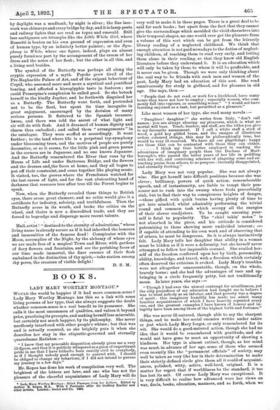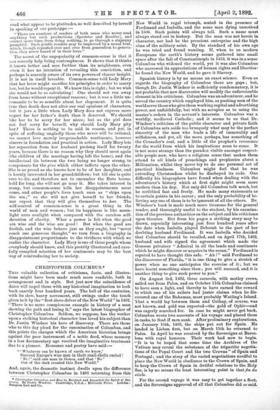BOOKS.
LADY MARY WORTLEY MONTAGU.* WOULD the world be happier if it had more common-sense Lady Mary Wortley Montagu has this as a link with some living persons of her type, that she always suggests the doubt whether common-sense is a real benefit to its possessor. She calls it the most uncommon of qualities, and values it beyond price, practising its precepts, and making herself less miserable, but certainly not much happier, by its philosophy. She never needlessly interfered with other people's whims ; but that was and is actually resented, as she brightly puts it when she describes her stay in the etiquette-governed and eternally quarrelsome Ratisbon
"I know that my peaceable disposition already gives me a very ill-figure, and that it is publicly whispered as a piece of impertinent pride in me that I have hitherto been saucily civil to everybody, as if I thought nobody good enough to quarrel with. I should be obliged to change my behaviour, if I did not intend to pursue my journey in a few days."
Mr. Ropes has done his work of compilation very well. The brightest of the letters are here, and one who has not the pleasure of the cheerful acquaintance of Lady Mary will do • Lady Mary Wortley Montagu : Select Passages front her Letters. Edited by Arthur R. Ropes, M.A. With 9 Portraits after Sir Godfrey Kneller and other Artists. London : Seeley and Co. 1992 very well to make it in these pages. There is a great deal to be said for such books ; but apart from the fact that they cannot give the surroundings which moulded the vivid characters into their temporal shapes, no one would ever get the pleasure from a volume of this sort which can be got from the leisurely
library reading of a neglected childhood. We think that enough attention is not paid nowadays to the duties of neglect- ing children, of teaching them to read very early, and letting them alone in their reading, so that they know old English literature before they understand it. It is an education whicb will only be taken by those to whom it will be profitable, and it never can be given. Though we were only thinking about the real way to be friends with such men and women of the past, Lady Mary had an education of this sort. She read omnivorously for study in girlhood, and for pleasure in old age. She says, then :—
"People that do not read, or work for a livelihood, have many hours they know not how to employ ; especially women, who com- monly fall into vapours, or something worse." "I would not have learning enjoined as a task, but permitted as a pleasure."
Like most women of her type, she read many novels :—
"Daughter ! daughter !" she writes from Italy, "don't call names : you are always abusing my pleasures, which is what no mortal will bear. Trash, lumber, sad stuff, are the titles you give to my favourite amusement. If I call a white staff a stick of wood, a gold key gilded brass, and the ensigns of illustrious orders coloured strings, this may be philosophically true, but would be very ill received. We have all our playthings : happy are those that can be contented with those they can obtain.
I think my time better employed in reading the adventures of imaginary people than the Duchess of Marl- borough's, who passed the latter years of her life in peddling with her will, and contriving schemes of plaguing some and ex- tracting praise from ethers, to no purpose : eternally disappointed, and eternally fretting."
Lady Mary was not very popular. She was not always wise. She got herself into difficult positions because she was
clever ; brilliancy, powers of quick action, rememberable speech, and of instantaneity, are liable to tempt their pos-
sessor not to rush into the swamp where fools proverbially sink, but to find their way to conspicuous heights of danger, —those gifted with quick brains having plenty of time to get into mischief, whilst admirably performing the trivial round and common task which occupy all the energies of their slower coadjutors. To be caught amusing your- self is fatal to popularity. The " chiel takin' notes" is not absorbed in the piece, and his attitude is considered
patronising to those showing more undivided interest ; or, if capable of attending to his own work and of observing that of others, be must be dangerous. So it is always instinctively felt. Lady Mary tells her daughter that ability in a woman must be hidden as if it were a deformity, but she herself never attempted to follow her impossible counsel. She availed her- self of the freedom conferred upon her by birth, personality, ability, knowledge, and travel, with a freedom which certainly
often deserved the criticism it evoked. Lady Mary's troubles were not altogether unaccountable, though, on the whole, bravely borne; and she had the advantages of race and up- bringing in a circle frequently petty, but not traditionally mean. In later years, she says :—
"Though I had ever the utmost contempt for misalliances, yet the silly prejudices of my education had taught me to believe I was to treat nobody as an inferior, and that poverty was a degree of merit: this imaginary humility has made me admit many familiar acquaintances of which I have heartily repented every one, and the greatest examples I have known of honour and in- tegrity have been among those of the highest birth and fortunes.'
She was never ill-natured, though able to say the sharpest things, and to make her social enemies writhe under satire
or jest which Lady Mary forgot, or only remembered for its wit. She would do a good-natured action, though she had no idea that it would be remembered with gratitude, and she would not have gone to meet an opportunity of showing a kindness. Her type is almost extinct, though, as her mind was much in advance of her age, some of those who seemed even recently like the "permanent officials" of society, may well be taken as very like her in their determination to make their strictly-defined circle give them all it could of acquaint- ances, polished, witty, active, well-bred, original. It is a matter for regret that if worldliness be the standard, it too has lost its salt. Of course Lady Mary was exceptional. It is very difficult to realise how advanced were her views on war, duels, books, education, manners, and so forth, when we read what appear to be platitudes, so well described by herself
in speaking of our prototype :— " There are numbers of readers of both sexes who never read anything but such productions [Spectator and Rambler], and .cannot spare time, from doing nothing, to go through a sixpenny pamphlet. Such gentle readers may be improved by a moral hint, which, though repeated over and over from generation to genera- tion, they never heard of in their lives."
The secret of the unpopularity of common-sense is that it can scarcely help being contemptuous. It shows that it thinks it knows better and sees further than its neighbours, even when it has no intention of revealing this conviction, and perhaps is scarcely aware of its own powers of clearer insight. It is not in itself loveable. Common-sense told Lady Mary that her lover might sacrifice his principles in order to marry her, but he would repent it. We know this is right; but we wish she would not be so calculating ! One should not run away from home without exceptional reasons ; bat it was a little un- romantic to be so sensible about her elopement. It is quite true that death does not alter our real opinions of characters, but it jars a little when Lady Mary does not express more
regret for her father's death than it deserved. We should like her to be sorry for her niece; but as the girl does
not feel sorry for herself, why should Lady Mary pity tier P There is nothing to be said in reason, and yet, in spite of suffering ungladly those who never will be rational, we cannot love merely irreproachable sentiments, however sincere in foundation and practical in action. Lady Mary lets her separation from her husband prolong itself for twenty
years, because there is no reason why they should meet again -(the children of the marriage having left the home), and the intellectual tie between the two being no longer strong, to compensate for the One which either inflicts upon the other. She is as proud as she knows how to be of her daughter, and is keenly interested in her grandchildren; but till she is quite
sure to die, and therefore not to encumber the Bute house- hold for long, she will not go near it. She takes interest in many, but common-sense tells her disappointments must come, and other people's lives touch ours as "ships upon the sea;" so she will not give herself to her friends, nor expect that they will give themselves to .her. The self-control of common-sense is a great thing in the world of men and women; but its happiness is like moon- light unto sunlight when compared with the careless self- devotion of charity. What a power is felt when the good are wise and the wise are good ! But when the good are foolish, and the wise behave just as they ought, but "never reach one generous thought," we turn from a biography in -disappointment proportionate to the vividness with which we realise the character. Lady Mary is one of those people whom -everybody should know, and this prettily illustrated and care- fully compiled selection of her sentiments may be the best way of reintroducing her to society.



































 Previous page
Previous page